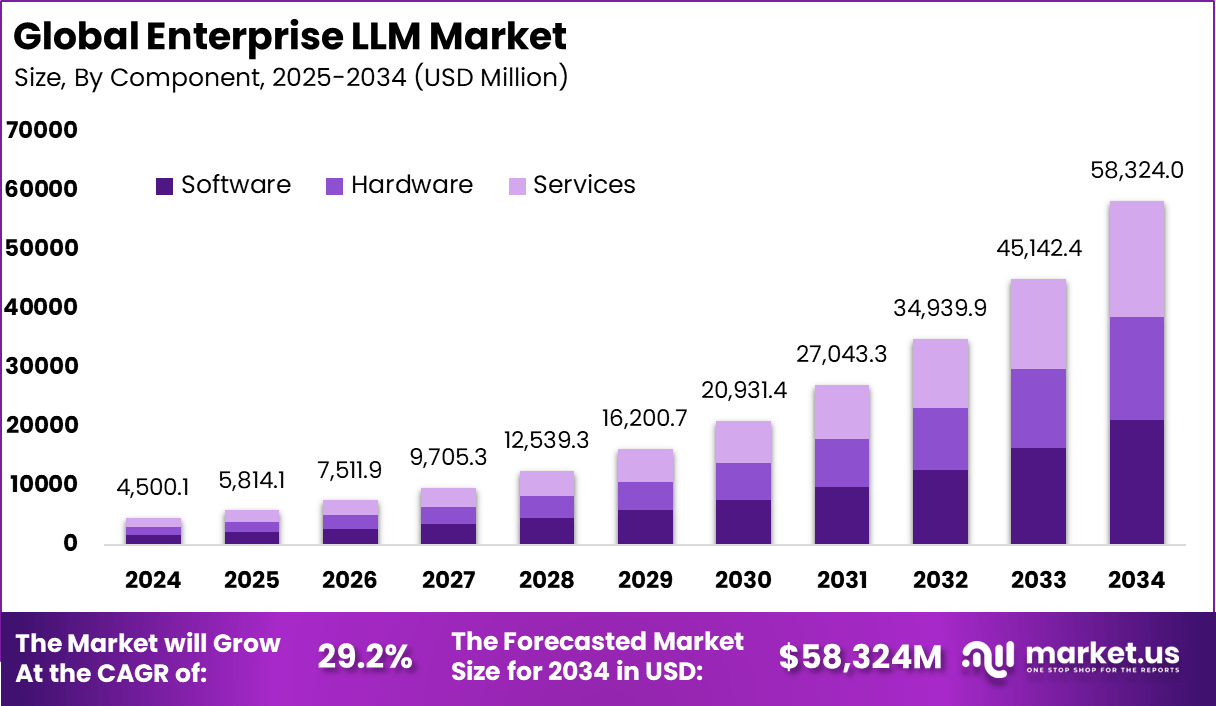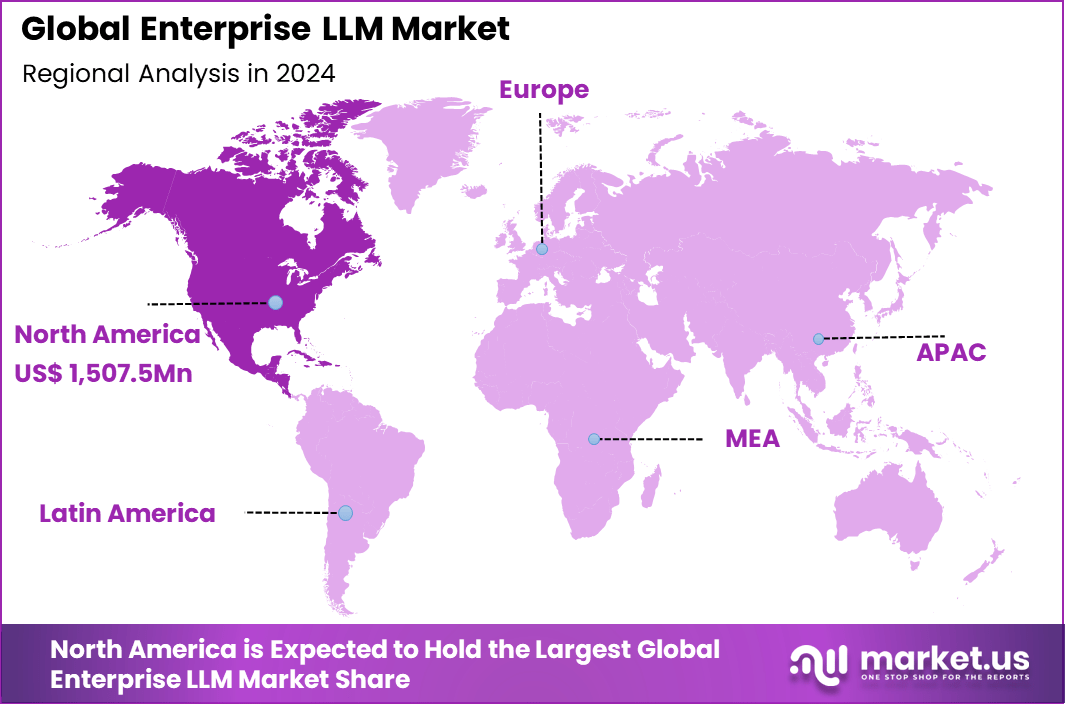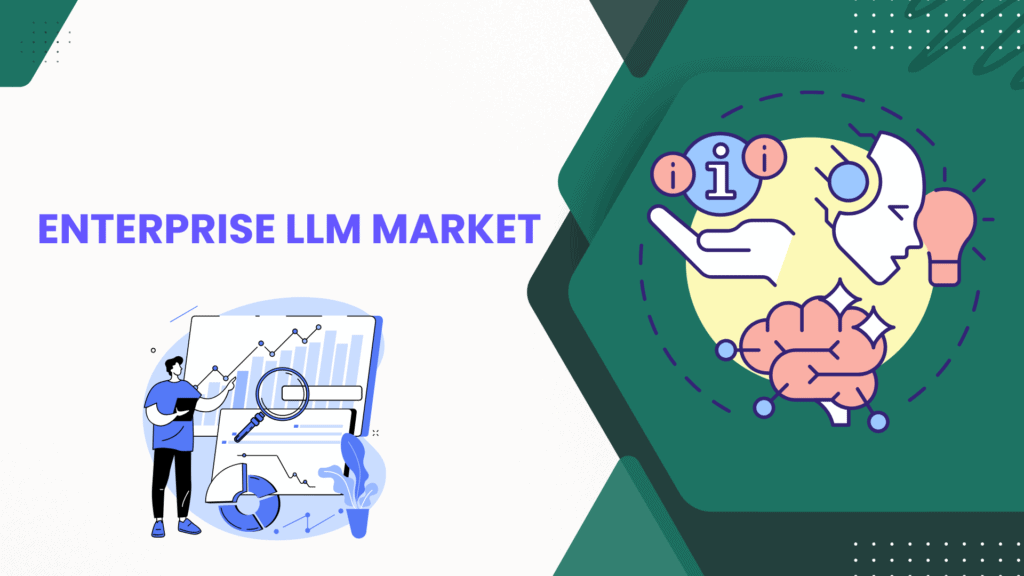Introduction
The global enterprise LLM market is undergoing rapid expansion, supported by the accelerating adoption of large language models in business operations, knowledge management, and customer engagement. In 2024, the market was valued at approximately USD 4,500.1 million, and it is projected to reach nearly USD 58,324 million by 2034, reflecting a strong CAGR of 29.2% between 2025 and 2034. The growth is being fueled by the ability of LLMs to streamline workflows, enhance decision-making, and reduce costs through automation and intelligent data processing across industries.
The Enterprise Large Language Model (LLM) market refers to the use of advanced AI language models tailored to meet the needs of businesses and organizations. These models help automate complex workflows, enhance decision-making, and improve customer interactions by processing vast amounts of data and generating human-like text. Enterprises use LLM technology to unlock value from unstructured data across diverse functions such as customer service, data analysis, and content creation.
A major driving factor behind the growth of the Enterprise LLM market is the increasing demand for intelligent automation across business processes. Organizations actively seek to deploy LLM-powered tools like chatbots and virtual assistants that deliver personalized, 24/7 customer service, reduce operational costs, and allow employees to focus on more strategic tasks. Furthermore, LLMs’ ability to extract insights from large volumes of unstructured data accelerates data-driven decision-making, offering enterprises a competitive edge.

Key Insight Summary
- General-Purpose LLMs dominated by model type, capturing 42.5% share of the market.
- By component, Software held the leading position with 36.2% share.
- Cloud deployment was the preferred mode, accounting for a strong 55% share.
- Large Enterprises emerged as the primary adopters, representing 60% share of the market.
- By industry vertical, Healthcare led adoption, contributing 20% share.
Analysts’ Viewpoint
The demand for Enterprise LLM technology is fueled by enterprises aiming to improve operational efficiency, reduce human error, and enhance workforce productivity. Enterprises are integrating LLMs in internal knowledge management, automating document summarization, and supporting real-time analytics. This adoption trend is supported by the growing recognition that LLMs help reduce time spent searching for information and enable quicker access to critical knowledge, which improves overall organizational agility. The promise of actionable insights and smarter resource allocation further sustains this demand.
Technologies seeing increasing adoption alongside Enterprise LLMs include intelligent automation platforms, advanced natural language processing systems, and AI-driven analytics tools. Many enterprises are transitioning to customized LLMs, focusing on fine-tuning and reinforcement learning to better align AI output with specific industry requirements. The preference for cloud-based and on-premises LLM deployments is also notable as businesses weigh security and compliance priorities against flexibility and scalability.
Key reasons for adopting Enterprise LLMs include the automation of repetitive, knowledge-intensive tasks, significant reduction in operational costs, and improvement in strategic decision-making. LLMs provide the ability to deliver continuous, multilingual support, which enhances customer experience. They also help enterprises stay agile in rapidly changing markets by offering predictive insights and accelerating innovation cycles. Many organizations view LLMs as essential tools to maintain competitiveness and fuel growth in a data-driven business environment.
Investment and Business Benefits
Investment opportunities in the Enterprise LLM market are strong, with rising enterprise budgets allocated to AI solutions. A significant portion of enterprises plan to increase spending on LLM capabilities, focusing on technologies that optimize workflows and unlock business insights. Investors are especially drawn to solutions that offer enhanced security, compliance with regulations, and domain-specific customizations. The expanding presence of specialized LLMs for vertical industries creates avenues for innovation and differentiated offerings, making this sector ripe for continued capital infusion.
The business benefits of Enterprise LLM adoption include increased productivity due to automation of manual tasks, cost savings from operational efficiencies, faster and more accurate decision-making, and accelerated innovation. Enterprises see improvements in customer satisfaction through enhanced service capabilities powered by LLMs. The ability to process and synthesize complex data faster leads to better resource allocation and risk management. Ultimately, LLMs empower organizations to work smarter and compete more effectively in their markets.
The regulatory environment impacting the Enterprise LLM market is evolving, with a growing focus on data privacy, security, and ethical use of AI. Stringent regulations such as GDPR and the EU AI Act require enterprises to implement robust compliance frameworks for AI deployments. Ensuring transparency, user consent, and safeguarding sensitive data are critical. Enterprises are adopting governance policies and monitoring practices to meet these requirements and manage risks associated with AI use, which are essential for maintaining trust and legal compliance in global markets.
Regional Analysis
In 2024, North America held a dominant position, capturing more than 33.5% of the total revenue, equivalent to USD 1,507.5 million. This leadership is attributed to the region’s early adoption of AI technologies, strong presence of cloud infrastructure, and significant investments in enterprise AI platforms. The rapid integration of LLMs in sectors such as finance, healthcare, IT, and retail has further reinforced North America’s position as the leading market, supported by favorable regulatory frameworks and continuous advancements in AI innovation.

Driver Analysis
Growing Demand for Intelligent Automation in Enterprises
The enterprise LLM market is driven strongly by the rising need for intelligent automation in business processes. Many organizations are adopting LLM-powered tools such as chatbots, virtual assistants, and content generators to improve customer service and streamline operations. These models enable enterprises to provide personalized and round-the-clock multilingual support, which helps manage large volumes of interactions efficiently while reducing operational costs.
Moreover, LLMs support advanced data analytics capabilities, extracting insights from unstructured data like customer feedback and market information. This accelerates decision-making and provides businesses with a competitive edge. Improvements in accuracy, context understanding, scalability, and multi-turn conversations continue to increase the value and adoption of LLMs in enterprises.
Restraint Analysis
High Computational Costs and Data Privacy Concerns
One significant restraint for enterprise LLM adoption is the high computational cost required for training and deploying these models. The infrastructure demands substantial computing power, leading to expensive deployment and maintenance costs. This cost barrier makes it challenging for small and medium enterprises with limited budgets to adopt LLM technologies fully.
Additionally, data privacy and security concerns impose limitations. Since LLMs depend heavily on vast datasets, often containing sensitive or regulated information, compliant data handling becomes complex. Enterprises operating in sectors like healthcare and finance must navigate strict regulations, which can slow model integration and increase the burden of ensuring data protection and governance.
Opportunity Analysis
Development of Industry-Specific Large Language Models
The growth opportunity in enterprise LLMs lies in building models customized for specific industries or scientific domains. Tailored LLMs can better understand domain-specific language, terminologies, and requirements, thereby improving accuracy and relevance in use cases such as finance, healthcare, Earth sciences, and astrophysics. This specialization enables companies to derive deeper insights and optimize workflows unique to their industry.
For instance, collaborations like NASA and IBM’s development of LLMs for scientific research exemplify this trend. Enterprises focusing on specialized applications of LLMs can gain a competitive advantage, opening markets for vertical-specific AI solutions that better address nuanced demands and regulatory compliance.
Challenge Analysis
Regulatory and Ethical Concerns
A major challenge facing enterprise LLMs is the increasing regulatory scrutiny around data privacy, model bias, and ethical use of AI-generated content. Governments and industry regulators are tightening rules to protect user data and ensure transparency in AI decision-making. Enterprises must implement costly compliance measures and develop ways to make LLM outputs interpretable and fair.
Furthermore, the “black box” nature of many LLMs makes it difficult to understand and explain their reasoning, which can reduce user trust. Ethical concerns over biased or inappropriate content generated by LLMs also create reputational risks. Addressing these regulatory and ethical challenges is critical for wider enterprise adoption and sustained growth in this market.
Key Market Segments
By Enterprise LLM Model Type
- General-Purpose LLMs
- Domain-Specific LLMs
- Custom/Proprietary LLMs
By Component
- Software
- Hardware
- Services
By Deployment Mode
- Cloud
- On-Premises
- Hybrid
By Enterprise Size
- Small & Medium size
- Large Enterprises
By Industry Vertical
- BFSI
- Healthcare
- Retail and e-commerce – Retail and E-commerce
- Legal and Compliance
- Manufacturing
- Others
Top Key Players in the Market
- Microsoft
- Google Inc.
- IBM Corporation
- NVIDIA Corporation
- Oracle
- Meta
- H2O.ai
- Apple Inc.
- Anthropic PBC
- Alibaba Cloud












